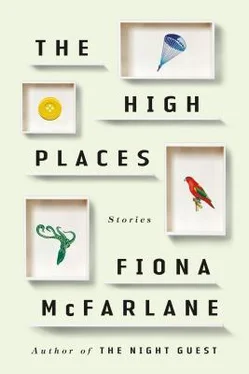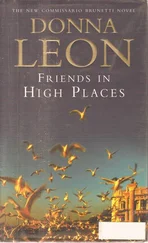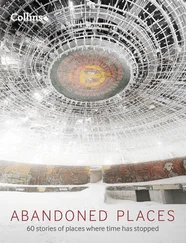This letter reached us before the one from our grandmother in distant Melbourne telling Nora and me that he was dead. Our mother wasn’t included in either letter, and we felt adult and private as we showed them to her. Nora was sadder than I was, so I learned from her how to be sad. She refused to believe the letters and persisted in a private conviction that someone else had been mistaken for our father, who had lost his memory, been rescued by the Americans, and now lived in New York City. He would find his way back to us, someday. I was three when he left. Back then, he would pick me up and pretend to throw me off the veranda, over and over, and I would laugh with terror, again and again.
For a while after that the war passed over us. The year between the letter from Hélène and the arrival of the Americans moved quickly. Things always moved quickly in our house. Spiders ran up the walls and weevils hurried through the flour and settled into their crunchy camouflage before you could be sure you’d seen them. The final baby was born, white as a turnip. The Americans came, and the Japanese, crammed into the hills around our town, a small piece of the war delivered directly to us, and to Frank.
Before he married our mother, Frank was one of Edith’s favourite subjects, because a city policeman moved to a country town like Merrigool was news. She didn’t know he wasn’t really city, but from the part of the city that’s scratchy and open, half town and half bush, on the flat baking plain under the mountains where no one really from the city would ever think to go. Frank was large and ugly. There was something so definite about him. He had country arms, though he wasn’t country, and hair the clingy colour of cicada shells. He had the use of a car that wasn’t his, though we never found out to whom it actually belonged.
‘This car isn’t mine,’ he’d say, stern and formal, whenever we climbed into it, ‘so watch yourselves.’
For a year after his arrival in Merrigool he fought bushfires, came limping and roaring off the football field, calmed the drunken flurries of old men in the streets, and swam the flooding river to rescue a dog that bit his big arm. Then he met our mother. She had the best legs in — and out of — town and carried with her the self-sufficient weather of a widow. Their courtship was private: late nights, swimming, driving in the car that wasn’t his, walking through long grass. Edith, who had always flapped to us with athletic stories of misdeeds and miracles, who always followed the scent of misfortune, of divorced women and almost-orphaned children, found one day the grassy, stubbly smell of Frank, massive on her chair in our kitchen, with his arms laid across the table. That afternoon, she addressed all her talk to Nora and me. Every time she visited us after that, she peered hesitantly into the kitchen before entering, unsure of what she might find. When Frank married our mother, she stopped coming. She didn’t visit their unbaptised babies — one, two, three, eventually four — and rarely acknowledged Nora and me in the scripture classes she taught at our school. Edith continued to sidle reverently on the pond shore, singing with the Baptists, and I watched her from the house and surprised myself by missing her in our kitchen.
Of course Frank wasn’t ugly, I now realise. But he had a mammoth face that loomed over us, and when he brought it to our level — shaded with new hair, blue at the roots — it looked as if parts of it had caved in. Nora tells me now that he was very attractive to women. ‘Jeanie,’ she says, when I talk about him, when I tell our husbands how ugly he was, sculpting his lion’s face with my hands, ‘Jeanie, you know, he was very attractive to women.’
One day he came home from work at dusk in that car he had the use of and found Nora cycling back and forth on the road by our drive, toward town and away from town, while I sat on the gatepost kicking my dirty feet. He stopped the car and unfolded himself from it. He watched Nora pedal away from him and began to jog after her, a jog that was long and slow and nevertheless covered the ground between them with unexpected speed. When Nora found him keeping pace with her, his knees lifting, his arms moving the air, she thought it was a game and threw her head back to laugh. But he reached out suddenly, took her under the arms, and lifted her from the bicycle, which wheeled along riderless, skidding and shaking. I watched Frank put Nora down and speak to her as he went for the bike. They walked back toward me, Nora nursing her arm. Often we rode the bike double, her feet moving in a swift blur, mine suspended over the dust-coloured road. Now we sat in that car with Frank, cruising slowly down the drive to the house, and Nora wouldn’t turn from the front seat to look at me. He spoke to us quietly, his left hand lightly on the wheel, about the things girls could and could not do. He explained to us that when he came home from work he expected to see us waiting for him, clean and ready for dinner.
That was not long after they married. The bike came out later for his eldest boy, clattered over the veranda, and was pronounced too rusty to ride.
* * *
Our father had sold the farm but the pond was still ours, half hidden among trees in the low folds of the beginnings of the hills. A waterhole, really, shaded by dry bush, sticky with duck mess, floating in the spring with the froth of the frogs that sang through the summer. The water was soft and brown and took the heat away, momentarily, until we resurfaced and it cupped over us again like a wet hand. The younger children, Frank’s, were tied to the big dead gum tree to stop them from rolling down the yard in the way they tended to, irresistibly drawn to the pond, into which they blundered and bobbed like pumpkins. Tied up, they circled the tree, getting tangled and tired in the shade, while Nora and I waded, bug-bitten, waterlogged, and out of sight of our mother. We stepped with long feet over the sunny banks, warm with worms and mud. We lay on the grass and the earth felt dry and clean between our fingers, and the sun was big and good, the flies busy on our foreheads and above our lips, the places where the sweat gathered. We knew we would burn to a purply-brown, and when we did we would lie awake heating the air in our bedroom for hours and make midnight trips to the bathroom to dip towels in cold water. We’d lie under our towels in a humid cloud. And in the subsequent days we’d itch and itch until the skin came off in raspy, silky skeins.
That’s how we all became so brown. Brown all year, brown feet, brown ears, brown in the parts of our hair. And stiff white hair, all of us, that later in our teens turned yellow and then unexpectedly dark. But when our hair was white, our mother cut it on the veranda every few weeks in the late afternoon. It grew quickly. Nora’s especially, which left uncut shimmered down her back in a wet white coil that distracted farmhands and diverted the loyalties of dogs. The haircutting took place on the veranda so we could watch for signs of Frank returning. The land in front of the house was flat as far as the road, and in the dark of winter the lights of the car carried a long way across it. In winter, we knew for five minutes beforehand that Frank was about to arrive and could make ourselves quiet and good.
Summer was different. The sun stayed until eight, the light until nine. The birds stayed too, scratching in the grasses, screaming in the trees. By the time we heard the sound of him we only had a minute to prepare. We all liked to be busy, or hiding. Or we sat in a row on the veranda, knees pressed together, a towel on every knee shining with a lapful of stiff white hair, our mother poised above us with her scissors.
Frank always took time leaving the car. It wasn’t large, but he was. The engine would stop its noise and he would sit in the car for a minute or more, collecting himself, I suppose. Nora and I — and probably our mother — had given up our attempts to predict what kind of mood he was in by watching his dark figure behind the windscreen. We all waited cautiously for his arrival in our evening lives, except for the baby, fat as a cabbage, who cooed from a cot and knew no fear. Sometimes the younger children would run down the steps to meet him as he rose from the car. They shuffled around him, offering their services for the carrying of hats and documents, and some days he accepted their offers, other days he swatted them away. On the best days, he swung one of them high into the air and onto his shoulders. The best days were usually ones on which he’d had some run-in with the Americans and come home ready to complain about them. Then he seemed to leap from the car, and the children laughed and flew, and when he stepped up onto the veranda even Nora looked happy to see him.
Читать дальше












